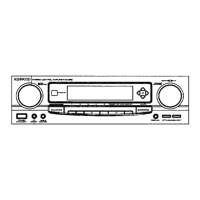
Do you have a question about the Kenwood KC-993 and is the answer not in the manual?
Lists included accessories like AC plug, audio cord, remote, batteries, and overlay sheet.
Instructions to record model and serial numbers for future reference and service.
Guidance on unpacking, checking for damage, and retaining packing materials.
Details power needs and voltage selector settings for US, UK, Europe, and other countries.
Warnings on water exposure, opening unit; explains safety symbols for voltage and instructions.
Covers power sources, cord protection, grounding, ventilation, and avoiding water for hazard prevention.
Addresses temperature, heat sources, electric shock, enclosure, magnetic fields, and cleaning.
Covers safe handling of carts, non-use periods, abnormal conditions, damage, and servicing protocols.
Details outdoor antenna grounding, proximity to power lines, and safe usage of AC outlets.
Identifies and describes front panel controls like INPUT SELECTOR, POWER, VOLUME, and EQ keys.
Explains indicators such as STAND BY, EQ. ON, AI AUTO, and display status lights.
Locates the sensor for receiving signals from the remote control unit.
Illustrates connections for cassette decks, turntable, tuner, CD player, VCR, and power amplifier.
Important notes on firm connections, unplugging power first, and avoiding AC outlet overload.
Shows connecting KENWOOD components via control cords for synchronized ON/OFF operation.
Explains how switched outlets allow synchronized power control with the main unit.
Describes automatic play and synchro recording features enabled by system control.
Explains remote control of system-connected components via the amplifier's unit.
Notes on inserting plugs fully and not connecting non-KENWOOD components.
Guides through powering on, selecting input, playing, and adjusting volume/balance.
Explains using the MUTE key on the remote to temporarily silence the sound.
Details activating CD DIRECT for optimal digital sound quality, bypassing controls.
Describes playing a CD while recording another source onto a cassette deck.
Step-by-step guide for recording onto a cassette tape, including tape dubbing.
Explains recording sound with equalizer effects for home or car/headphone use.
How to control surround processor (SS-992/SS-592) and adjust volume using the remote.
Operation of non-surround components connected to TAPE 2/ADAPTOR jacks, including selector settings.
How to set equalizer to flat and select desired preset equalizer patterns.
Explains AI AUTO function for automatic equalizer pattern selection based on music.
Lists and describes R1-R5 (Reference) and M1-M5 (Manual) equalizer presets.
Explains Graphic equalizer, Spectrum analyzer, and Demonstration display modes.
Guide on adjusting equalizer bands and levels to create custom sound profiles.
Instructions on saving created equalizer patterns into memory for recall.
Instructions for removing cover, inserting batteries, and closing the cover.
Notes on battery life, replacement, and memory retention during battery changes.
How to turn system on and operate components using the remote, including operating range.
Identifies and explains remote unit controls for various functions in AUDIO mode.
Explains LEARN/USE and MODE switches for operating KENWOOD or programming other devices.
Differentiates AUDIO mode for KENWOOD components and VIDEO mode for programming other devices.
Describes using the overlay sheet to label programmed keys on the remote control.
Step-by-step guide to program remote control signals from other units onto the KENWOOD remote.
Limitations and important notes on programming, such as signal strength and memory capacity.
How to verify programmed remote control signals are working correctly.
Instructions on clearing all programmed settings and resetting the remote unit.
Common symptoms (no sound, hum) with causes and remedies for amplifier and speakers.
Troubleshooting remote operation issues, including battery and connection problems.
Lists technical data: frequency response, input sensitivity, signal-to-noise, distortion.
Includes power consumption, AC outlets, dimensions, weight, and regulatory compliance.